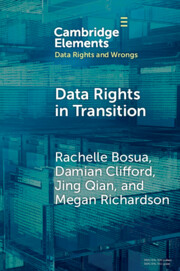About this Series
This Cambridge Elements series provides a home for fresh arguments about data rights and wrongs along with legal, ethical and other responses. We encourage new ways of thinking about data as enmeshed within complex social, institutional and technical relations. We are particularly interested in work addressing the transformations inherent in digitisation, automation, the development of artificial intelligence, and in related and comparable sociotechnical change. We are also interested in comparative studies, cross-disciplinary and interdisciplinary studies, and contributions that cross temporal and geographical boundaries. The series has an interdisciplinary and international editorial team, with expertise across law, information studies, communication, the humanities and social sciences. The series has three thematic clusters: 1) reviewing the fundamentals; 2) building blocks recalibrated; 3) novel and creative approaches.
Areas of interest
- new ways of identifying, conceptualising, characterising and interpreting data rights and data wrongs
- discussions of the impacts of digitisation, automation, artificial intelligence and other sociotechnical changes in the development of data rights and wrongs
- inquiries into new and emerging laws, ethical and other regulatory frameworks underpinning, expressing and giving effect to data rights and wrongs
- new formulations and conceptualisations of good data practices, and the legal, ethical and other frameworks needed to achieve these
- studies which draw upon historical, social cultural, political and institutional lenses and perspectives
Series Editors
Damian Clifford
Jeannie Paterson
About the Series Editors
Damian Clifford is an Assistant Professor at the London School of Economics and Political Science. Previously a Senior Lecturer and Postdoctoral Research Fellow at the Australian National University, and FWO Aspirant Fellow at KU Leuven’s Centre for IT and IP Law (CiTiP), his research focuses on data protection, privacy and technology regulation, and he has published across these fields. His recent books are Data Rights and Private Law (ed with Jeannie Marie Paterson and Kwan Ho Lau, 2023); Data Protection Law and Emotions (2024); and Data Rights in Transition (with Rachelle Bosua, Jing Qian and Megan Richardson, 2025).
Jeannie Marie Paterson is Director of the Centre for AI and Digital Ethics at the University of Melbourne and a Professor of Law at the Melbourne Law School. Her research focuses on themes of support for vulnerable consumers; the regulation of new technologies in consumer and financial markets; and regulatory design for protecting consumer rights and promoting safe, fair and accountable technologies. Her recent books include Misleading Silence (ed with Elise Bant, 2020); and Data Rights and Private Law (ed with Damian Clifford and Kwan Ho Lau, 2023).
Editorial Board
Megan Richardson, Honorary Professor at the Melbourne Law School, the University of Melbourne.
Rachelle Bosua, Senior Lecturer at Deakin University and an Honorary Senior Fellow in the School of Computing and Information Systems at the University of Melbourne
Jake Goldenfein, Senior Lecturer at the Melbourne Law School, the University of Melbourne
Julian Thomas, Director of the ARC Centre of Excellence for Automated Decision-Making and Society, and a Distinguished Professor in the School of Media and Communication at RMIT University in Melbourne
Mark Andrejevic, Professor, Communications & Media Studies, Monash Data Futures Institute
Sara Bannerman, Professor, McMaster University, and Canada Research Chair in Communication Policy & Governance
Claes Granmar, Associate Professor, Faculty of Law, Stockholm University
Sonia Katyal, Associate Dean of Faculty Development & Research, Co-Director Berkeley Center for Law & Technology, Roger J Traynor Diistinguished Professor of Law, UC Berkeley
Andrew Kenyon, Professor of Law, Melbourne Law School, the University of Melbourne
Orla Lynskey, Professor of Law and Technology, University College London
Frank Pasquale, Professor of Law, Cornell Tech and Cornell Law School, New York
Julia Powles, Executive Director of the UCLA Institute for Technology, Law, and Policy; Professor of Practice; Tech Policy Lead, UCLA DataX
Trisha Ray, Associate Director and Resident Fellow, GeoTech Center, Atlantic Council
Peggy Valcke, Professor of Law & Technology and Vice-Dean of Research, Faculty of Law & Criminology, KU Leuven
Normann Witzleb, Associate Professor of Law, Chinese University of Hong Kong
Contact the Editors
If you would like more information about this series or you are interested in writing an Element, please email Professor Richardson at m.richardson@unimelb.edu.au.
We are grateful to the ARC Centre of Excellence for Automated Decision-Making and Society (ADM+S) and the University of Melbourne’s Centre for AI and Digital Ethics (CAIDE) for their support for this series.
